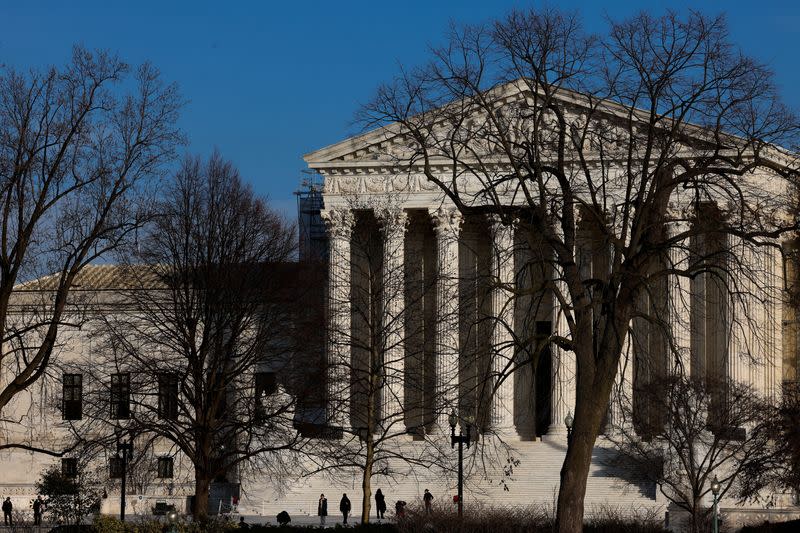US Supreme Court appears split over US agency powers in fishing dispute

By John Kruzel and Andrew Chung
WASHINGTON (Reuters) -The U.S. Supreme Court on Wednesday appeared divided over a bid to further limit the regulatory powers of federal agencies in a dispute involving a government-run program to monitor for overfishing of herring off New England's coast.
The justices heard arguments in appeals by two fishing companies of lower court rulings allowing the National Marine Fisheries Service to require commercial fishermen to help fund the program. The companies - led by New Jersey-based Loper Bright Enterprises and Rhode Island-based Relentless Inc - have argued that Congress did not authorize the agency, part of the U.S. Commerce Department, to establish the program.
The companies have asked the court, with its 6-3 conservative majority, to rein in or overturn a precedent established in 1984 that calls for judges to defer to federal agency interpretation of U.S. laws deemed to be ambiguous, a doctrine called "Chevron deference."
The questions posed by the justices did not reveal a clear majority willing to overturn the precedent. Some of the conservative justices seemed skeptical of the doctrine's continuing force. Others signaled hesitation about reversing it. The court's liberal justices appeared ready to preserve the doctrine's deference to the expertise of agencies.
Conservative Justice Neil Gorsuch, sounding skeptical of the precedent, said the doctrine has created confusion in lower courts in the cases before the court on Wednesday - and many others.
"Even in a case involving herring fishermen, and the question whether they have to pay for government officials to be on board their boats ... lower court judges, even here in this rather prosaic case, can't figure out what Chevron means," Gorsuch told Elizabeth Prelogar, the U.S. solicitor general who was arguing for President Joe Biden's administration.
The regulation at issue called for certain fishermen to carry aboard their vessels U.S. government contractors and pay for their at-sea services while they monitored the catch.
Conservative Justice Brett Kavanaugh criticized Chevron as ushering in instability by making it easier for new presidential administrations to define laws differently than prior administrations.
"That is at war with reliance," Kavanaugh told Prelogar. "That is not stability."
But conservative Justice Amy Coney Barrett expressed worry that overruling Chevron could invite "a flood of litigation" contesting agency actions that had been previously resolved.
The bid by the commercial fishermen, supported by various conservative and corporate interest groups including billionaire Charles Koch's network, is part of what has been termed the "war on the administrative state," an effort to weaken the federal agency bureaucracy that interprets laws, crafts federal rules and implements executive action.
The Supreme Court has signaled skepticism toward expansive regulatory power, issuing rulings in recent years to rein in what its conservative justices have viewed as overreach by the Environmental Protection Agency and other agencies.
'A DOCTRINE OF HUMILITY'
Liberal Justice Elena Kagan said that legislation passed by Congress often leaves interpretative "gaps." Kagan cited as an example future legislation regulating artificial intelligence, including to address problems that cannot be anticipated.
"Congress knows that this court and lower courts are not competent with respect to deciding all the questions about AI that are going to come up in the future. And what Congress wants, we presume, is for people who actually know about AI to decide those questions," Kagan told Roman Martinez, a lawyer for Relentless.
"We don't even know what the questions are about AI, let alone the answers to them - we being the court," added Kagan, who called Chevron "a doctrine of humility."
Conservative Chief Justice John Roberts raised examples of where lines between legal questions that a court may answer and policy questions that should be left to an agency may blur, such as the length of trucks on interstate highways.
"Isn't the policy judgment of the agency pertinent in that situation?" Roberts asked Martinez.
But Roberts also told Prelogar that the Supreme Court has not resorted to Chevron deference for several years.
"Have we overruled it in practice?" Roberts asked.
The fish conservation program - started in 2020 under former President Donald Trump and now defended by Biden's administration - aimed to monitor 50 percent of declared herring fishing trips in the regulated area, with program costs split between the federal government and the fishing industry.
Biden's administration has said the program is authorized under a 1976 federal law called the Magnuson-Stevens Act to protect against overfishing in U.S. coastal waters. It said in court papers the program was suspended for the fishing year starting in April 2023 due to insufficient federal funding.
A ruling by the Supreme Court is expected by the end of June.
(Reporting by John Kruzel; Editing by Will Dunham)

 Yahoo Finance
Yahoo Finance 